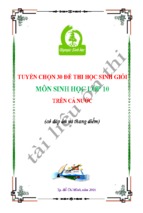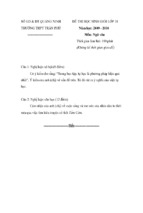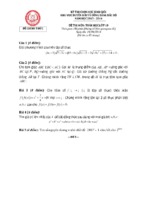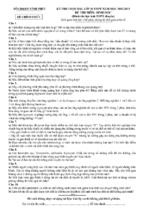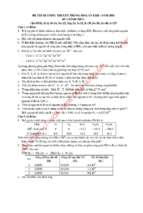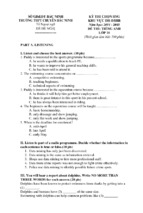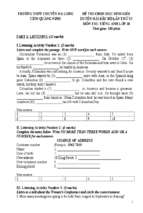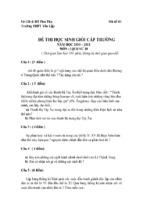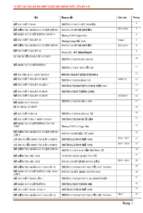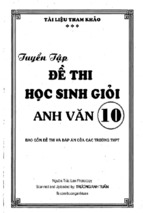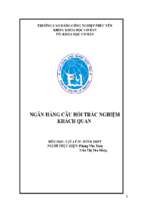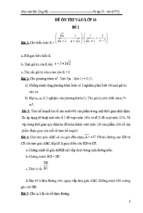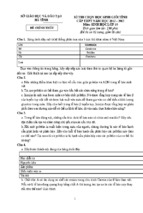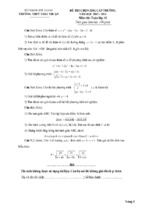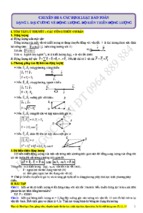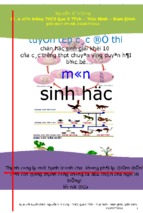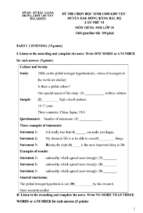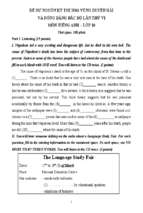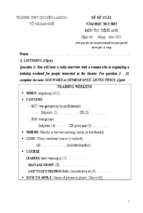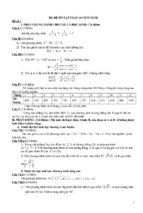Sở Giáo dục - Đào tạo
Nam Định
KÌ THI CHỌN HỌC SINH GIỎI
THPT CHUYÊN – DUYÊN HẢI BẮC BỘ
Năm học 2012 - 2013
Môn thi : Tiếng Anh- Khối 10
Thời gian làm bài: 180 phút
(Bài thi gồm trang. Tổng điểm: 100)
PART ONE. LISTENING
Part 1: Listen and supply the blanks with the missing information. Write your answers in the
numbered box. (ONE WORD ONLY)
Nice houses used to be (1)…………..instead of being given away and this idea quickly caught on.
Good business for real (2)……………. agents is added up by a tax break for the home builders and a
free home for the (3)………….. Eight houses have been (4)…………..to East Palo Alto.
One of the (5)………………. that East Palo Alto faces is that they don’t know what to do with the
houses that people are offering them, because they don’t own any (6)………..
East Palo Alto now figures out how to handle the (7)……………..
and share the wealth. It is an (8)…………………. of riches to East Palo Alto.
(9)……………….., drugs and drive-by shootings earned East Palo Alto the title “murder (10)
…………..”
1. bulldozed
2. estate
3. needy
4 donated
5. dilemmas
6. property
7. windfall
8. embarrassment
9. poverty
10. capital
Part 2: Listen and choose A, B, C or D
1. Regarding the tutorials, Lorraine…………….
A. find them very useful
B. is hesitant about saying what she thinks
C. states that they are useless
D. thinks they could be improved
2. Farilla………………
A. has two daughters who have been causing her trouble.
B. is a single parent with a daughter in her teens.
C. is an immature student
D. is a teenager.
3. Farilla feels that………………………….
A. her eldest daughter is to blame for the family problems.
B. her youngest daughter is to blame for her family problems.
C. her husband is to blame for her family problems.
D. her taking the course is the cause of her family problems.
4. When he was 16, Stevie took on a job………………………
A. because he desperately needed the money.
B. for no reason
C. to help his mother out
D. to help his brother out
5. Dr Goldfinch suggests that Farilla should…………………..
A. get her daughter a job.
B. speak to Stevie’s mum.
C. give up the course.
D. explain the situation to her daughters.
1. B
2. A
3. D
4. C
5. D
Part 3: You will hear a report about the economic policies by the president of the United States
after the election. Listen and supply the blanks with the missing information. Write your
answers in the numbered box. (NO MORE THAN THREE WORDS)
Leaders in both Republican and Democratic Party made their opening bids on how to deal with the
tax spending and (1)…………………..
When the commander-in-chief Barrack Obama entered the East Room, there were (2).........................
sitting in chairs, ready to jump to their feet.
The President said if they want to reduce deficit, they have to combine spending cuts with revenue
On Election Day, (3)........................ voters said they agree that the rich should pay more.
Meanwhile, House Speaker John Boehner made his opening play, saying it’s time to clean up
(4)...............................and lower people’s rates.
Professor Ed Kleinbard of the University of Southern California Law School agrees with increasing
tax collections from higher-income Americans without increasing their nominal tax rates, and that
there are a lot of deductions that favor the rich.
At the end of the year, the Bush tax cuts end, deep (5)................................... will go into effect and
payroll tax cuts expire, all of which are the powerful incentive for everyone to get something done. .
The Congressional Budget Office says if Washington doesn't fix the problem, the U.S. economy
could go into another recession
1. debt problems
2. Nearly 200 supporters
3. Six in ten (6 in 10)
4. (the) tax code
5. automatic spending cuts
PART TWO. VOCABULARY – GRAMMAR
Exercise I. Choose the best option to complete these sentences.
1. Please accept our ___ congratulations!
A. finest
B. warmest
C. dearest
D. deepest
2. I had no chance to defend myself: the dog ____ for me as soon as I opened the door.
A. went
B. ran
C. fell
D. stood
3. You should ___ at least three days for the journey.
A. expect
B. permit
C. accept
D. allow
4. Please ____ a copy of your application form for at least six months.
A. return
B. revise
C. retain
D. refer
5. ____, dolphins have no sense of smell.
A. As known as far
B. It is known as far C. Known thus far as
D. As far as is
known
6. Most of ___ archeologists know about prehistoric cultures is based on the studies of material
remains
A. these
B. what
C. which
D. the
7. Now considered an art form, quilt-making originated as a means of fashioning bed covers from bits
of fabric that otherwise _____
A. not use
B. were no use
C. had no use
D. not was not used
8. The chemicals spilled over the road and left drivers____ for breath.
A. suffocating
B. gasping
C. inhaling
D. wheezing
9. We will have to either increase overtime working or ____ new staff.
A. take on
B. take off
C. take down
D. take up
10. The building work must be finished by the end of the month____ of cost
A. ignorant
B. thoughtless
C. uncaring
D. regardless
11The consultant called in by the firm brought a -------------------of experience to bear on the problem
A wealth
B realm
C bank
D hoard
12. Children can be difficult to teach because of their short attention ___
A. limit
B. span
C. duration
D. time
13. Christine’s face ___up when she heard the good news.
A. showed
B. cleaned
C. warmed
D. lit
14. Ellen decided that election to the local council would provide a ___ to a career in national
politics.
A. springboard
B. turning point
C. milestone
D. highway
15. She expressed her ____ for certain kinds of cheaply produced movies.
A. disapproval
B. distaste
C. dissatisfaction
D. disloyalty
D. Probably
16. Deborah is going to take extra lessons to……… what she missed while she was away.
A. catch up on
B. cut down on
C. put up with
D. take up with
17. The report notes that forty percent of lawyers……….the profession are women
A. entering
B. joining
C. joining in
D. joining up
18. It is very difficult to………the exact meaning of an idiom in a foreign language.
A. convert B. convey C. exchange
D. transfer
19. There will be another performance due to ……… demand.
A. popular B. reasonable C. constant
D. famous
20 I didn’t want to ------------------him his moment of triumph, so I congratulated him on defeating me
A decline
B forgo
C deprive
D deny
1b 2a 3d 4c 5d 6b 7c 8b 9d 10d 11a 12b 13d 14a 15b
16 A17 A 18 B 19A 20 D 9 D 10 A
Exercise 2. Mistake correction
.When the first white men came to America, they found vast amounts of nature resources of
tremendous value. Forests covered with a large part of the nation; later, gas, oil and minerals were
found in unbelievable amounts. There was great abundance of very fertile soil. Forests, prairies,
streams and rivers abounded with wildlife. So vast were these resources that it seemed that they could
never be used to. So forests were destroyed to make way for farmland. Grassland and prairies were
ploughed and harrowed. Minerals and oil were used in great quantities to supply a young industry
nation. Almost every river became the scene of factories, mills and power companies. Mammals and
birds were slaughtered with food and sport.
In a short time, the results were obvious. Floods caused millions of dollar’s worth of damage yearly.
The very fertile soil washed away or blew up in great clouds. The seemingly inexhaustible oil and
minerals showed signs of depletion. Rivers were filled with silt from eroding farms and wastes from
factories. Much of the rivers were made unfit for fish. Several species of birds disappeared and some
mammals seemed on the verge of going. Future timber shortages were predicted. In addition,
Americans soon came to realize that some sort of conservation program must be set up.
1. nature=> natural
2. covered with => covered
3. great => a great
4. used to => used up
5. industry nation => industrial nation
6. slaughtered with => slaughtered for
7. In a short time => within a ………
8. dollar’s => dollars’
9. much of the rivers => many…………..
10. addition => short
Exercise 3: Fill each gap in the sentences below with suitable prepositions or adverb particles
1. The toy doesn’t come …………….batteries. You have to buy them separately.
2. He finally rebelled………………..his strict upbringing.
3. I need to read………………..the company before I go on the job interview.
4. I don’t really hit it………………………my new boss.
5. I would give up my job…………………..the top of a hat if only I could find a better one.
6. We’ll discuss the affair ……………………a cup of tea.
7. “ I understand Diana lost her job” Yes, But she’s actually better………………. She found a
more interesting job with higher salary.
8. There were a few things I didn’t like about the professor, but…………..and large, I enjoyed it.
9. “Frank doesn’t take a hint very well, does he?” “ No, you have to spell things
…………………Frank. He likes everything crystal clear.
10. “ Are you going to medical school?” “ Not this year, but I wouldn’t rule it………………in the
future.
1. with
2. against
3. up on
4. off with
5. at
6. over
7. off
8. by
9. out for
10. out
Exercise 4: Give the correct form of the words given below
1.
The doctor advised him to follow his ………………………diet strictly. (DIABETES)
2.
Species often use…………………..for small scale reproduction of documents. (FILM)
3.
I think it’s sheer ………………….to get married in church if you don’t believe in God.
(HYPOCITE)
4.
Newspapers blamed the chaos after the flood on the ……………………of the local
officials. (ADMINISTER)
5.
It was impossible to read the pedestal inscription for it had been …………………… by
some mindless vandal. (FACE)
6.
Both of the fighting sides have agreed on a temporary …………………. just to let the
civilians safely leave the place. (ARM)
7.
The seemingly ……………………oil and minerals have shown signs of depletion over
the years. (EXHAUST)
8.
Could you please help me……………………….the twoo words “differ” and
“differentiate” (AMBIGUOUS)
9.
A famous …………………… has just published a book about murder. (CRIME)
10.
This article is about people who claim to have ………………………disabilities such as
mind- reading. (NORMAL)
1. diabetic
2. microfilm
3. hypocrisy
4. maladministration
5. defaced
6. armistice
7. inexhaustible
8. disambiguate
9. criminologist
10. paranormal
Exercise 5; Fill each blank with one suitable word
In 1942, only a few months after the USA had entered World War II, President Roosevelt, Secretary
of State Cordell Hull, and his deputy, Summer Wettes, along with many politicians, journalists were
already involved in a debate (1)…………………post war arrangements. Many of the proposals were
far- reaching, (2)……………….revolutionary, in (3)………………….other country did the shock of
war create such a response at a time when Nazis and the Japanese were so clearly winning. Such
activities contrast strikingly with the negativism that now, in our peaceful time, characterizes the
discussion, when there is any, of an international organization for the future. (4)………………..the
end of the war, (5)……………..from the usual xenophobes, few voices questioned the need for the
new international system, on the contrary, there was a tendency to oversell it and to create unrealistic
hopes.
Thus when the cold war – along with the usual tendency of soverpign states to (6)………………to
violence shattered the dream of a more rational world, public disillusion and hostility to the UN (7)
…………….all the fiercer. In fact, the UN has never (8)………………..recovered from its failure to
live up to its advance notices.
Already in 1942 there were warning voices. ProfessorNicholas Spykman of Yale wrote (9)
……………"plans for far-reaching changes in the character of international society are an intellectual
by-product of all great wars," but they haver.evei altered "the fundamental power patterns," Spykinan
predicted that the new postwar order (10)………….. remain"a world of power politics in which the
West will continue to demand the preservation of a balance of power in Europe and Asia
1. over/ about
2. even
3. no
4. since
5. apart
6. resort
7. became
8. quite
9. that
10. would
PART THREE: READING COMPREHENSION
Exercise 1: Read the text below and then decide which word best fits each space A, B, C or D
Dutch children enjoy freedom
"Let them be free" is the (1)…………..rule for child-rearing in the Netherlands. No wonder Dutch
kids have been (2) ………….Europe's most fortunate by a recent UNICEF survey. From a tender age,
their opinions are (3) …………., their wishes respected, and there is no homework until their last
year in preparatory school. Some would (4) …………. that the tendency of Dutch society to
encourage infants to experience whatever they please has (5) ………….a whole generation into
spoilt, undisciplined brats. Others say family members are remarkably open with one another, feeling
free to say anything, and that the way parents (6) ………….with their children's anxieties means that
the children are well-adjusted, which is (7) ………….up by the results of the survey. Dr Gerrit
Breeusma, head of development psychology at the University of Groningen says the survey's results
came as no (8) ………….. "Children have al ways played a very important role in Holland but there
were (9) ………….within families during the Sixties, usually over matters of discipline and
conformity. As a result, the generation growing up at that time have made sure they get on better with
their kids," he added. However, in several Dutch police precincts, such liberalism is not viewed positively. In an attempt to (10) ………….underage heavy drinking, police have taken to bringing home
teenagers and threatening parents with obligatory attendance at courses on excessive alcohol problem
or hefty fines unless they keep their children under rule.
1. A. iron
B. golden
C. solid
D. fixed
2. A. rated
B. put
C. compared
D. assessed
3. A. regarded
B. recognized
C. valued
D. measured
4. A. criticize
B. argue
C. defend
D. judge
5. A. resulted
B. created
C. brought
D. turned
6. A. empathize
B. understand
C. analyse
D. handle
7. A. shown
B. held
C. made
D. backed
8. A. doubt
B. difference
C. surprise
D consequence
9. A. conflicts
B. beliefs
C. decisions
D. contradictions
10 A. extinguish
B. supervise
C. tackle
D. dispose
1. B
2. A
3. C
4. B
5. D
6. A
7. D
8. C
9. A
10. C
Exercise 2: Read the following magazine article and choose the correct answers to the
questions that follow.
As Philadelphia grew from a small town into a city in the first half of the eighteenth century, it
became an increasingly important marketing center for a vast and growing agricultural hinterland.
Market days saw the crowded city even more crowded, as farmers from within a radius of 24 or more
kilometers brought their sheep, cows, pigs, vegetables, cider, and other products for direct sale to the
townspeople. The High Street
Market was continuously enlarged throughout the period until 1736, when it reached from Front
Street to Third. By 1745 New Market was opened on Second Street between Pine and Cedar. The
next year the Callow hill Market began operation.
Along with market days, the institution of twice-yearly fairs persisted in Philadelphia even after
similar trading days had been discontinued in other colonial cities. The fairs provided a means of
bringing handmade goods from outlying places to would-be buyers in the city. Linens and stockings
from Germantown, for example, were popular items.
Auctions were another popular form of occasional trade. Because of the competition, retail merchants
opposed these as well as the fairs. Although governmental attempts to eradicate fairs and auctions
were less than successful, the ordinary course of economic development was on the merchants' side,
as increasing business specialization became the order of the day. Export merchants became
differentiated from their importing counterparts, and specialty shops began to appear in addition to
general stores selling a variety of goods.
One of the reasons Philadelphia's merchants generally prospered was because the surrounding area
was undergoing tremendous economic and demographic growth. They did their business, after all, in
the capital city of the province. Not only did they cater to the governor and his circle, but citizens
from all over the colony came to the capital for legislative sessions of the assembly and council and
the meetings of the courts of justice.
1. What does the passage mainly discuss?
A. Philadelphia's agriculture importance B. Philadelphia's development as a marketing center
C. The sale of imported goods in Philadelphia D. The administration of the city of Philadelphia
2. It can be inferred from the passage that new markets opened in Philadelphia because…………..
A. they provided more modem facilities than older markets
B. the High Street Market was
forced to close
C. Existing markets were unable to serve the growing population
D. farmers wanted markets that were closer to the farms.
3. The word "hinterland" in line 3 is closest in meaning to………………..
A. tradition B. association
C. produce D. region
4. The word "it" in line 6 refers to
A. the crowded city B. a radius C. the High Street Market D. the period
5. The word "persisted" in line 9 is closest in meaning to………………..
A. returned B. started
C. declined D. continued
6. According to the passage, fairs in Philadelphia were held……………..
A. on the same day as market says.
B. as often as possible
C. a couple of times a year
D. whenever the government allowed it
7. It can be inferred that the author mentions "Linens and stockings" in line 12 to show that they were
items that
A. retail merchants were not willing to sell
B. were not available in the stores in Philadelphia
C. were more popular in Germantown man in Philadelphia D. could easily be transported
8. The word "eradicate" in line 16 is closest in meaning to…………………..
A. eliminate B. exploit
C. organize D. operate
9. What does the author mean by stating in line 17 that "economic development was on the
merchants' side"?
A. Merchants had a strong impact on economic expansion.
B. Economic forces allowed
merchants to prosper.
C. Merchants had to work together to achieve economic independence
D. Specialty shops near large markets were more likely to be economically successful.
10. The word "undergoing" in line 22 is closest in meaning to………………..
A. requesting B. experiencing
C. repeating D. including
B
2. C 3. D 4. C 5. D 6. C 7. B 8. A 9. B 10. B
Exercise 3: Choose the most appropriate heading from the list A-H for each part (1-6) of the
article. There is one extra heading which you do not need to use. An example is given.
A
B
C
D
E
F
G
H
Research holds the key to success
New and improved techniques
A new kind of athlete
New equipment has made a difference
Athletes are what they eat
Personalized programmes will help
The influence of drugs
Is there a limit to record-breaking?
RECORD-BREAKERS
0- H
A world record is every athlete's dream, but the hard-won records of a few years ago are mostly just
today's qualifying times. Roger Bannister's famous four-minute mile of 1956 has been beaten by
nearly 15 seconds, while almost an hour and twenty minutes has been taken off the women's
marathon since. 1953. 'Faster, higher, stronger', is the Olympic motto, and today's competitors
continue to push back the boundaries of what the body can achieve. But one wonders if this can
continue.
1………………..
The last forty years have seen many important 20 technological advances. For example, since the
introduction of strong, flexible fibreglass poles, over a metre has been added to the pole vault record.
There have also been important developments in the design of the running shoe. And while a shoe
won't actually make someone run faster, modem shoes do mean many more miles of comfortable,
injury-free training.
2 ……………………………..
Pushing back the limits now depends more on science, technology and medicine than anything else.
Athletic technique, training programmes and diets are all being studied to find ways of taking a few
more seconds off or adding a few more centimetres to that elusive world record. It seems that natural
ability and hard work are no longer enough.
3 …………………………..
The search to find more efficient ways of moving goes on. Analysis of an athlete's style is particularly
useful for events like jumping and throwing. Studies show that long jumpers need to concentrate not
on the speed of approach, as once thought, but on the angle their bodies make with the ground as they
take off. However, the rules governing each sport limit advances achieved by new styles. For instance
only one-footed takeoffs are allowed in the high jump.
4…………….
In the future, it should be possible to develop a more individual approach to training programmes.
Athletes will keep detailed diaries and collect data to help predict the point when training becomes
overtraining, the cause of many injuries. If athletes feed all their information into a database, it may
then be possible to predict patterns and to advise them individually when they should cut down.
5………………………………
Combining the right diet with a training programme is vital. Athletes are continually searching for
that special 'go-faster' ingredient, but apparently it's still a battle to get them to drink sufficient liquid
and to follow a balanced healthy diet throughout all phases of training, competition and recovery.
Diet in the period after an event is particularly important and often neglected. An athlete who doesn't
replace all the liquid lost immediately after a hard run won't be able to repeat the performance at the
same level 24 hours later.
0 h 1 D 2 A 3 B 4F 5 E 6 C
Exercise 4: Choose from the sentences A-G the one that fits each gap 1-5.
MODERN ENGLISH
Imperceptibly, during the 18th century, English loses the most noticeable remaining features of
structural difference
(0) …….J………….. By the end of that century, with but a few
exceptions, the spelling, punctuation, and grammar are very close to (1)……………….. If we
take an e by William Hazhu(1778-1830) or a novel of Jane Austen (1775-1817), for example, we can
read for pages (2)……………… We would find the vocabulary somewhat unfamiliar in places, the
idiom occasionally unusual or old-fashioned, the style elegant or quaint, and we might feel that the
language was in some indefinable way characteristic of a previous age: but we do not need to consult
a special edition or historical dictionary at every turn ……….(3)
…….. Jane Austen makes
demands on our modern linguistic intuitions which seem little different from those required by
Catherine Cook son or P D. James .
However, (4)
, the language at the end of the 18 century is by no means identical to what we
find today. Many words, though spelt the same, had a different meaning. And an uninformed modern
intuition would achieve only a superficial reading of the literary texts of the period. In reading a novel
of the 1990s, we can make an immediate linguistic response to the social and stylistic nuances
introduced into the text, (5)…………,: we recognize die differences between formality and
Informality, or educated and uneducated: we can sense when someone is being jocular, ironic, risqué,
archaic or insincere. We can easily miss such nuances in the writing of the early 19th century;
especially in those works which take the manners of contemporary society as their subject. That
world is more linguistically removed from us than at first it may appear.
A because the context often enables us to see the intended sense
B what they are today
C because we are part of its age
D when we know it had an additional meaning at that time
E if we had tape recordings of the time
F before a point of linguistic difference might make us pause
G which distance the Early Modern English period from us
1E
2I
3A
4C
5F
PART IV. WRITING
Exercise 1. Rewrite each of the following sentences in such a way that it has the same meaning
as the printed above sentence.
1. The final version of the plan was quite different from the initial draft
=> There was ….. ………………………………………………………
2. What Rachel does in her spare time doesn’t concern me
=> What Rachel ……………………………………………………
3. There are a lot of people depending on him.
=> He has ….. ………………………………………………………
4. The fate of the two climbers is unknown.
=> It’s a….. ………………………………………………………
5. His action was incomprehensible to his parents.
=> His parents were at ….. ………………………………………………………
Exercise 2. For each of the sentences below, write a new sentence as similar as possible in meaning to the
original sentence using the word given. This word must not be altered in any way.
1. Everybody made fun of him because he’d his hair cut so short. (MICKEY)
2. She was very relieved when she realized that her bag hadn’t been stolen. (BREATHED)
3. They arrived at the station with only a minute to spare. (NICK)
4. In the area, Thailand is much better than all other countries in football. (SHOULDERS)
5. The president arranged for me to use his chauffeur-driven car whenever I liked. (DISPOSAL)
Exercise 2. Write a paragraph about the advantages of E - learning. You should write about 200 words.
Exercise 1
1. There was ….. (little/ no/ not much resemblance between the final version and the initial draft)
2. What Rachel does in her spare time … (is none of my business)
3. He has a lot of dependants.
4. It’s a mystery as to what happened to the two climbers
5. His parents were at a loss when they tried to understand his action.
Exercise 2
1. Everybody took the Mickey out of him because he had his hair cut so short.
2. She breathed a sign of relief when she realized …
3. They arrived at the station in the nick of time.
4. In the area, Thailand is head and shoulders above all other countries in football.
5. The president placed/put his chauffeur-driven car at my disposal.
Dowload full:
https://drive.google.com/drive/folders/125AMfEIWZWpIV9k_pcCSrbsP-4n1p9zq?usp=sharing
- Xem thêm -

